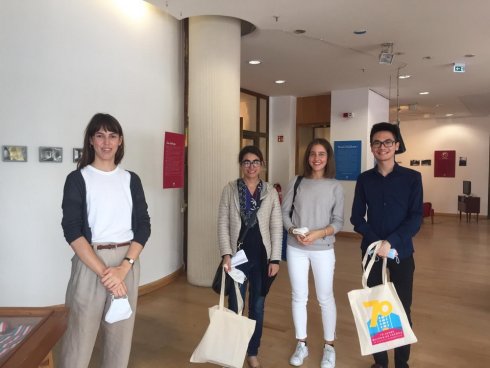Culture under Pandemic
70 ans ma parole: The French Institute opens “la Maison de France” for its 70 years anniversary
September 16th, 2020The current pandemic has changed all domains of our societies. Among them, cultural sectors might be one of the most influenced aspects of our social lives: most of international or cultural events have been either postponed or cancelled while people are prioritizing other forms of interaction putting cultural events aside.
However, cultural events enrich our mindset and thanks to technology, we are able to partecipate in various events online. On the other hand, some other projects are taking place these days after being postponed. In fact, cultural institutes and promoters are reorganizing their schedules in order to encourage people to approach different cultures. For example, the Maison de France is holding a public (and free) exhibition about its history.
Established on April 21st, 1950 by the former French ambassador to Germany, André Francois-Ponchet, the “Maison de France” has always been an important role in establishing new German-French relations after the Second World War as well as a place of encounter and exchange.
This year, the French cultural center located in Kurfürstendamm 211, celebrates its 70th anniversary as a symbol of German-French ties and tool of diplomacy. Starting from June 4th to October 9th, visitors have the possibility to learn about history of the institution – by now, the symbol of French culture in Berlin. Germany and France enjoy long-lasting diplomatic ties. This exhibition provides Berliners the opportunity to collect information of this important institution that has always been contributing to straighten the friendship between the two allied countries over the years.
Today, a delegation of the ICD, Valeria Fugiani, Elena Argentesi, and Ching-Chieh Su were honored to visit the exhibition and conducted an interview with Miss Cécile Guarinoni, Kulturassistentin at the Maison de France.
Miss Guarinoni, can you explain to us your responsibilities and tasks?
I’m the cultural assistant at the Institute and I've been working here for more than 2 years by now. Concerning my responsibilities, first of all, I organize events such as literature evenings, theaters, movies nights, exhibitions at the gallery, etc. The current exhibition shows all the history of the Institute. It was interesting to prepare for the exhibition because we had to take a look at our historical archives. By doing so, we discovered a lot of things that we didn’t know or forgot. I think that it is a great exhibition because of its interactivity. Another important task of mine is communication, either print or online. Also, an essential part of my job is to find sponsors such as companies that help us to plan big events.
Why did you choose to host a physical event instead of an online one? What have been the main challenges?
The possibility of letting visitors coming inside is not the main problem for us because fortunately, the gallery is spacious and we respect and implement hygiene measurements such as wearing masks, handwashing (everywhere here you can find sanitizers), and social distancing. Next week we are going to host another physical event about DDR and its influence nowadays. For this event we cooperate with two researchers who study this specific topic and they will present a book about it. It is challenging to obey social distancing but we hope this event can take place. We also organized some online events and that turned out to be positive experiences, but I think that now people are ready to wear a mask for several hours and interact among them safely.
What do you expect visitors to learn from this event?
I think that they could learn a part of Berlin history that they didn’t know or they have forgotten. Our job is to bring it back in order to disclose it to the public. For example, there is a part of French Institute’s history that some people don’t know or don’t remember. I’m talking about the other French Institute that was the only west cultural center located in East Berlin. Many French artists held exhibitions there and there were always long queues of visitors outside the building waiting to attend the events. It was very interesting for us to get to know this.
Considering the consequences of the pandemic, how do you expect the future relations between France and Germany specifically regarding the cultural field?
I think that we should be positive because both governments of France and Germany are saving up money and promised to help the promotion of culture and this will be for us (I hope) an important opportunity. We have planned a lot of events for the near future and people are still interested in what we do. I also think that altogether with the dynamic of Europe we can make it!


